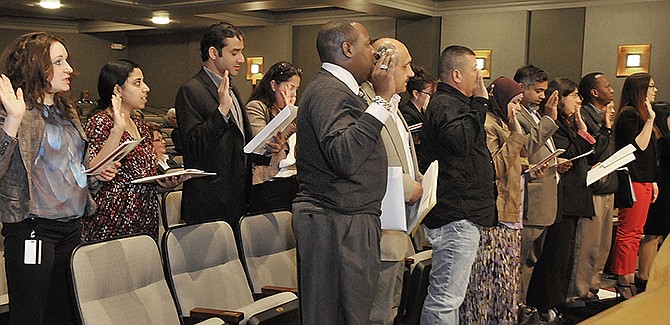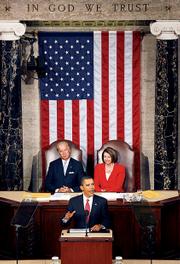Central Missouri is home to 30 newly minted citizens today, the result of a naturalization ceremony held Thursday afternoon at the Miller Performing Arts Center.
After swearing an oath of allegiance to the United States and crossing the stage to receive their certificates, the new citizens were greeted with hugs of relief and tears of joy by friends and family gathered to watch the proceedings.
For many of them, the brief ceremony marks the end of a long and arduous immigration process.
"I'm so happy. I've been waiting for a very long time," said Preethi Ballijepalle, a 28-year-old business analyst for Central Bancompany.
Watching from the audience, Ballijepalle's husband and mother beamed with delight to see her cross the stage. The family planned to celebrate with friends and inform relatives in India later that evening.
For 26-year-old Dilnoza Halik, formerly of Uzbekistan, taking the oath of allegiance was the finale to a 10-year journey marked by hardship and sacrifice.
She was 16 when she first tried to emigrate to America. It took her five years to arrive here, and five more to become a naturalized citizen.
"I was separated from my parents for five years," she said, explaining that her parents traveled ahead of their daughters to America, leaving the girls in the care of their grandparents. "It was extremely hard. Sometimes a teenager needs her parents."
For a few years, she and her sister lived and attended college in Malaysia. She was granted a visa for permanent residency when she was 21.
For Halik, becoming an American is her dream. She doesn't not feel sadness about leaving Uzbekistan, only a little nostalgia.
"I'm very proud to be an American. This is the country we all wanted to live in and that gave us great opportunities," she said. "I have a lot of dreams I would not be able to achieve if I still lived in Uzbekistan."
In her home country, Halik might be allowed to get an education, but she would be hampered in using it.
"I would be miserable there. I'm open-minded, independent," she said. "I would not want to be dependent on my husband. I want more than that."
Although she's currently an accounts manager for Veterans United, she's considering law school.
The adage, "America is the land of opportunity," might be a cliche, but that makes it no less true, she said.
"I've been here only five years and I'm on my way," Halik said.
For 43-year-old Gagneesh Rawat of India, the decision to become naturalized wasn't an easy one.
Ultimately, for Rawat, his decision wasn't based on economics or convenience. He wanted to be a part of American's grand democratic experiment.
A specialist in information technology, Rawat first arrived here in 1990, following a wave of friends who were emigrating.
"The U.S. seemed like a good career move," he said.
He came first and his wife and child arrived a year later. The family lived in New Jersey and Florida, where long commutes, traffic snarls, and too many people complicated their lives.
"On the East Coast, stress is in the air," Rawat said.
But he couldn't envision living in the hinterlands of Mid-Missouri.
When his wife landed a job opportunity at Carfax in Columbia, the family was pulled this direction. She liked the Carfax team and his daughter liked the idea of a nice backyard, but Rawat didn't know if he'd like the Midwest.
Ultimately she was able to overcome his hesitations.
On Thursday afternoon, after the ceremony was over, he sat quietly in the atrium of the Miller Performing Arts Center filling out the form for his new U.S. passport.
"Why do I want to be an American?" he echoed. "It's because I believe in the principals of the Constitution. And I admire the equality in society."
"There's a lot of respect for each job and profession," he said. "And the system is pretty fair. You don't mind paying taxes, because you can see your money is put to use."
In other nations, unchecked police and political corruption hurt people, he said.
Rawat has served as a soccer coach here, but by becoming a U.S. citizen, he'll be able to do even more.
"I've always wanted to vote," he explained. "When you're a citizen, you can do more than discuss, you can participate."
He's actually the last member of his family to become a naturalized American. Whereas once his conscience pricked at the thought of abandoning India, today it feels like the right decision.
"You want to do it at a time when you feel comfortable," he said. "For me, it's the right time. The U.S. is a great country."
Accompanying article:


